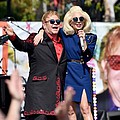U.S. District Judge Amy St. Eve has tossed a lawsuit brought by a photojournalist against Elton John over the song Nikita.
According to Guy Hobbs, he had written a song in 1982 called Natasha about love between a western man and a Ukrainian woman during the cold war that could not be fulfilled. In 1985, Elton John released the song Nikita that was of a very similar theme. The record went on to climb to number 7 in the U.S. and number 3 in the U.K.
According to Hobbs, he saw the lyrics to the song in the early 2000¡äs and claimed that the similarities between the two songs were striking. He went on to sue John and co-writer Bernie Taupin.
St. Eve ruled that the lawsuit could not go forward, writing that, although the themes and some of the lyrics are similar; however, ¡°these themes are not protected under the Copyright Act because they are rudimentary, commonplace, and standard under the sc¨¨nes ¨¤ faire doctrine. Moreover, phrases and themes that are common, trite, or clich¨¦d are not protected under copyright laws.¡±
In addition ¡°the phrases, ¡®you¡¯ll never know,¡¯ ¡®to hold you,¡¯ and ¡®I need you¡¯ are commonly used in musical lyrics. Also, short phrases that do not express an ¡®appreciable amount of original text¡¯ are not subject to copyright protection.¡±
Thus, after filtering out the non-protected elements, no similarities exist between the two songs except for generic themes, words, and phrases, as discussed above. In other words, the ubiquity of the common sayings sprinkled throughout both Nikita and Natasha, along with the repeated use of these commons phrases and sayings in other songs, establish that Defendants¡¯ lyrics to ¡®Nikita¡¯ do not infringe on Hobbs¡¯ lyrics to ¡®Natasha.¡¯¡±
Most likely Elton is very happy about the ruling but there¡¯s no word on how he reacted to his song being called ¡°common, trite, or clich¨¦d.¡±
Elton John news










